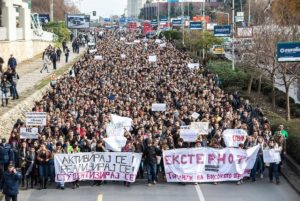As Macedonia’s early parliamentary election is fast approaching there are clear signs that Macedonia may experience something known as an “electoral revolution” following the tumultuous events of the past two years. What is an electoral revolution and what can it tell us about what is going on in Macedonia? Many leading experts on democracy have studied electoral revolutions, commonly referred to as “color revolutions” in the media, not just in the post-socialist context of Central and Eastern Europe, but also in Africa, Asia, and Latin America. In particular, the scholars Valerie Bunce and Sharon Wolchik have concluded that electoral revolutions are “attempts by opposition leaders and citizens to use elections, sometimes in combination with political protests, to defeat illiberal incumbents or their anointed successors; to bring liberal oppositions to power; and to shift their regimes in a decidedly more democratic direction.”
Having started in the 1970s and 80s these phenomena spread across the globe arriving in Central and Eastern Europe, particularly the Balkans, in the mid-1990s following the collapse of socialism. Beginning in places like Bulgaria, Romania, and Slovakia the electoral revolutions quickly spread to neighboring states including Croatia, Serbia and Montenegro, Georgia, Ukraine, and Kyrgyzstan. Bunce and Wolchik have argued that the diffusion of such revolutions is due to the development of a strong civil society, opening of space for democratic political changes, collaboration between international and local democracy promoters, the role of local opposition groups, and the use of elections as a form of regime transition. Interestingly, in post-socialist Central and Eastern Europe these electoral revolutions have been rather successful in removing authoritarian political figures from power. However, beyond that success these revolutions have struggled to establish the roots of a more “authentic” democratic political system. So what can this tell us about Macedonia’s upcoming elections on December 11?
The past two years for Macedonia have been a whirlwind of shocking events. From student protests, a wiretapping scandal, internationally brokered political agreements and a deadly shootout in Kumanovo to presidential pardons for corrupt politicians, mass street protests, and the creation of Special Prosecutors Office, Macedonia has seen it all. These events are clear indications that Macedonia has determinedly drifted toward open authoritarianism with former Prime Minister Nikola Gruevski and his VMRO-DPMNE party at the helm of the country. The mobilization of citizens and their renewed political consciousness during the protests of the past two years makes this weekend’s election a unique opportunity to stem the tide of the regime’s anti-democratic policies.
Considering that the main opposition party SDSM has formed a coalition with well-known activists and academics, local and international NGO’s have steadfastly encouraged citizens to exercise their right to vote, and the wrongdoings of the regime are constantly at the center of attention, Macedonia is exhibiting many of the precursory signs to an electoral revolution. Ultimately, whether opposition forces in the country are successful in their bid to vote out the kleptocratic regime is in the hands of Macedonia’s citizens.
 However, regardless of whether former Prime Minister Gruevski and his ruling party are voted out of office, Macedonia will have an incredibly difficult task ahead. As previous electoral revolutions in the region have shown it is not simply the act of voting out a dictator that will instill democratic values and practices. Take for example Serbia, where strongman Slobodan Milosevic was ousted in 2000 by a liberal opposition which ascended to power. Yet, the country never really created a democratic system in which illiberal practices would be limited. Now sixteen years later many in Serbia argue that their current prime minister, Aleksandar Vucic, is exhibiting the same illiberal characteristicswhich resembled Milosevic before him and other anti-democratic leaders in the region today. Thus, in order to avoid this scenario in Macedonia both citizens and politicians must continue to engage in the political process and actively transform the current system.
However, regardless of whether former Prime Minister Gruevski and his ruling party are voted out of office, Macedonia will have an incredibly difficult task ahead. As previous electoral revolutions in the region have shown it is not simply the act of voting out a dictator that will instill democratic values and practices. Take for example Serbia, where strongman Slobodan Milosevic was ousted in 2000 by a liberal opposition which ascended to power. Yet, the country never really created a democratic system in which illiberal practices would be limited. Now sixteen years later many in Serbia argue that their current prime minister, Aleksandar Vucic, is exhibiting the same illiberal characteristicswhich resembled Milosevic before him and other anti-democratic leaders in the region today. Thus, in order to avoid this scenario in Macedonia both citizens and politicians must continue to engage in the political process and actively transform the current system.
Luckily for Macedonia, many of the steps necessary to democratize society and the political system are in place and need to be nudged forward by citizens and willing politicians. First, after years of protest and civic engagement it seems that Macedonian society has awakened from an apathetic slumber which discouraged their participation in politics. Maintaining the engagement of citizens, in other words practicing democracy, is of utmost importance going forward. Following this election, regardless of the victor, citizens must not retreat. They must hold their ground and push forward the changes necessary to make life in Macedonia better for all.
Second, the previous regime must be held accountable for their crimes which were highlighted in the wiretapped recordings. From electoral manipulations, murder, hate-crimes, and the use of the public administration for party purposes all of these violations must be tried in court. For that reason it is of crucial significance that the next government in power must grant the Special Prosecutors Office, charged with investigating these crimes the necessary financial resources, manpower, and authority to do so. Stopping the work of this institution, the most trusted public institution in Macedonia, would doom all efforts to guide the country toward justice and democracy.
Third, the full implementation of the reforms highlighted by the European Commission’s “Recommendations of the Senior Experts’ Groupon systemic Rule of Law issues relating to the communications interception revealed in Spring 2015 ” also known as the Priebe Report must be a top priority of the government. Media freedom, judicial reform, and the issue of state-capture among other problems are all addressed in this report. Implementing the proposed reforms with guidance from the “Blueprint for Urgent Democratic Reforms” developed by the NGO sector in the aftermath of the protestswill provide Macedonia with the tools to buffer itself from such dilemmas in the future.
Lastly, proposedreforms to Macedonia’s electoral model have been floating around public discourse recently. Tackling the problems in this area stalled during negotiations between political parties prior to setting the election date and ultimately fizzled out. Many Macedonian citizens have been disillusioned by both main parties, whether ethnically Macedonian or Albanian, and are seeking alternatives in new as well as old smaller parties. However, under the current electoral system voting for smaller parties is discouraged and their chances to enter parliament are limited. In the interests of producing a more pluralistic and democratic parliament the debate surrounding the electoral model should be revisited. Among the most popular ideas has been transforming Macedonia into a single electoral district and providing open lists where citizens elect the specific individuals they want to represent them. This will be helpful in that both small parties can succeed and the authoritarian tendencies within established parties which stamp out individuals who do not fall in line with their party can be eliminated.
 In the end, it will be the citizens of Macedonia who decide their future. It is estimated that over thirty percent of the electorate is undecided and who they decide to give their vote to will have a tremendous impact on the future of the country. Citizens will be deciding between two starkly opposing visions of the future. The first is the status quo of the current ruling party, the richest party in Europe, known for the dismantling of Macedonia’s fledgling democracy. The second option is the future. It is the range of opposition parties on the left and even right which are calling for an end to the corruption and authoritarian dealings of the current system. As one of their slogans says – they are offering life in Macedonia. However, they too have been warned. If they are elected to power and do not pursue the agenda for a more democratic Macedonia then they will be faced with resistance from people in the streets – paint, whistles, banners, and all.
In the end, it will be the citizens of Macedonia who decide their future. It is estimated that over thirty percent of the electorate is undecided and who they decide to give their vote to will have a tremendous impact on the future of the country. Citizens will be deciding between two starkly opposing visions of the future. The first is the status quo of the current ruling party, the richest party in Europe, known for the dismantling of Macedonia’s fledgling democracy. The second option is the future. It is the range of opposition parties on the left and even right which are calling for an end to the corruption and authoritarian dealings of the current system. As one of their slogans says – they are offering life in Macedonia. However, they too have been warned. If they are elected to power and do not pursue the agenda for a more democratic Macedonia then they will be faced with resistance from people in the streets – paint, whistles, banners, and all.


0 comments